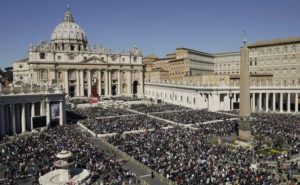 Pastor Rick Phillips recounts his recent interaction about the Protestant Reformation with local Roman Catholic scholars in Greenville, SC (original source here):
Pastor Rick Phillips recounts his recent interaction about the Protestant Reformation with local Roman Catholic scholars in Greenville, SC (original source here):
Probably the most interesting Reformation celebration that I had the privilege of participating in last month took place in a Roman Catholic Church. The Center for Evangelical Catholicism here in Greenville, SC graciously invited me to join with two other Protestants and three Roman Catholic scholars to discuss the Reformation. I was grateful for the warmth of my reception and for the valuable interaction.
Perhaps the most interesting part of this event was the panel discussion, in which the host priest asked a number of insightful questions. For instance, he asked us to consider how things might have been different if the Roman Catholic establishment had been more patient and accommodating with Martin Luther. The idea was that Leo X (nobody’s favorite pope) handled Luther with such clumsy arrogance that he provoked the great schism that resulted. Might there have been a Lutheran order within the Roman church, he wondered, if the pope was more sophisticated and skillful?
My answer–which provoked a fair amount of unhappiness–was that it was inconceivable that the movement of the Protestant Reformation should have accommodated Rome simply because of the irreconcilable stances towards the Bible. Christians who adhered to sola scriptura – the authority of Scripture alone – could never endure a papacy that demanded that its tradition stood beside (and in practice above) the plain meaning of Scripture. Moreover, by study of the Bible, the Protestants came to the conclusion that the papacy was an utterly illegitimate and usurping office. In fact, wherever the Bible was embraced as supreme, the denunciation of the pope soon followed, a situation quite unlikely to permit a Lutheran movement inside the Roman tent. Furthermore, Roman Catholicism was just as opposed to the authority of Scripture as the Reformers were opposed to the papacy. It was for this reason that Rome so vigorously suppressed the spread of the Bible, going so far as to burn at the stake those who made it available to the common people.
As you can imagine, the warmth of my reception began to chill during this discourse. Especially my claim that Rome had suppressed the spread of Scripture was denounced as a false and tired canard! The host priest protested: “Why, Rome has done more for Bible translation than any other Christian body! Only in England was Bible translation suppressed, and that was done by the secular authority and not the church!”
This claim incited me to go back and study the evidence for Rome’s suppression of Scripture. To say the least, it is extensive! Consider the following:
Pope Gregory VII: forbade access of common people to the Bible in 1079, since it would “be so misunderstood by people of limited intelligence as to lead them into error.”
Pope Innocent III: compared Bible teaching in church to casting “pearls before swine” (1199).
The Council of Toulouse (France, 1229): suppressed the Albigensians and forbade the laity to read vernacular translations of the Bible.
The Second Council of Tarragon (Spain, 1234) declared, “No one may possess the books of the Old and New Testaments, and if anyone possesses them he must turn them over. . . that they may be burned.”
In response to the labors of John Wyclif, the English Parliament (under Roman Catholic influence) banned the translation of Scripture into English, unless approved by the church (1408).
The Council of Constance (Germany/ Bohemia, 1415) condemned John Hus and the writings of Wyclif because of their doctrine of Scripture and subsequent teachings. Hus answerd: “If anyone can instruct me by the sacred Scriptures. . . , I am willing to follow him.” He was burned at the stake.
Archbishop Berthold of Mainz threatened to excommunicate anyone who translated the Bible (1486).
Pope Pius IV expressed the conviction that Bible reading did the common people more harm than good (1564).
It is true that in many cases, the papacy suppressed Scripture because it was being used to teach against the church. But this is exactly the point the Reformers argued: Rome would not allow the Scripture to speak with authority and for that reason suppressed it.
Wyclif wrote: “where the Bible and the Church do not agree, we must obey the Bible, and, where conscience and human authority are in conflict, we must follow conscience.”
For this doctrine and its further implications, his body was exhumed and burned, his ashes scattered in a nearby river, and his Bible translation banned.
So much for the Protestant “canard” regarding the Roman Catholic attitude to Bible translation, teaching, and distribution!
The record shows that if there was a single conviction that motivated and guided the Protestant Reformation, it was the authority of Scripture alone to speak for God in matters of faith and life. On this vital matter, the great John Wyclif and his martyr-disciple John Hus spoke with all the clarity that would burst forth through Martin Luther and others in the 16th century.
Wyclif did not live to see a widespread Reformation, but died under harassment and scorn. Yet by wonderful providences, his writings spread far away to Bohemia where John Hus advocated them with zeal and power. Hus, too, did not live to see a Reformation, but died in solitary disgrace amidst the flames of a scornful church. Yet his influence endured, through the spread of Scripture, so that Martin Luther exclaimed, “We are all Hussites!”
The Protestant Reformation, which we have been celebrating these past weeks, was above all a Reformation of and by the Word of God. What compelling evidence Wyclif, Hus, and Luther gave to Isaiah’s claim that God’s Word will not go forth in vain but shall succeed by God’s power (Isa. 55:11)! It is for this reason that accommodation with Rome would have been unthinkable to Luther and his followers, since sola scriptura compelled them to stand against false teaching with the Word of truth. Their courageous stance, blessed by God’s mighty aid, reminds us that we also will never send forth God’s Word in vain. If we will stand within the secular church of America, and yes, of evangelicalism, and hold forth the Word of God, he will not fail to bless it with the saving and reforming power our generation so greatly needs.





